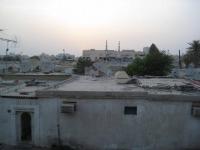Why Blame It On Dubai?
Today I got an email comment from Naresh Nayak of Marunouchi, Tokyo about my Open Letter to Johann Hari; Nayak says:
As I’ve said repeatedly in this blog (come to think of it, I’ve been singing the same tune for about 40 years, and will probably be doing so until the day I die):
My point is this is a global problem, not a Dubai problem.
Unfortunately, I’m not an economist, and I don’t pretend to have the solutions to the mess in which we (i.e. humanity as a whole), find ourselves.
For example, if people weren’t so desperately poor across the rest of the Middle East and Asia, they wouldn’t need to come to Dubai to work in sometimes deplorable conditions for relatively low (at least by Western standards), wages.
The fact is the money many expatriate labourers earn here allows them to support others, often many others, back in their home countries.
Should they have to make the difficult choice of being away from wives, husbands, children and extended families to make a living? Of course not. Should they be forced to live in sub-human conditions? I don’t think so.
(And, at the risk of belabouring the point, neither should anyone anywhere.)
Should they not sell their labour in markets outside of their home countries as a matter of principle, and as a result sink to even greater depths of poverty?
Hmmmm. Tough choice. I’m glad I don’t have to make it.
 Naresh Nayak writes from Tokyo, which I visited in November.
Naresh Nayak writes from Tokyo, which I visited in November.
It was my first visit to Japan and I was struck by the cleanilness and orderliness of the place. Overall, people looked happy, healthy and prosperous, even in the small village outside of Kyoto where I stayed with my friend Fukiko.
While I was in Tokyo, however, I snapped photographs of a tent community of homeless people, and a man sleeping in a city park.
That same evening I walked through a tunnel:
 Is it acceptable for a prosperous city such as Tokyo to have people camped out in parks and sleeping in the streets?
Is it acceptable for a prosperous city such as Tokyo to have people camped out in parks and sleeping in the streets?
Are the slums in Africa, India, Brazil, Peru and the United States acceptable? No. Certainly not. (BTW, you can see the sad truth of it here: www.worst-city.com.
What kind of world is this? Why must little girls beg for bread in Kabul? Why are more women and children than ever starving in India? Is it fair that the average life expectancy for a Malawian woman is 37, and one in five children there is an orphan.
The appalling poverty portrayed in Slumdog Millionaire is not a figment of some scriptwriter’s overactive imagination. It’s real. And it exists today. ALL OVER THE WORLD. Is that acceptable? No. Full stop.
Please don’t misunderstand me. The fact that homelessness, poverty and abuse exist elsewhere doesn’t make it right.
 My place shared a wall with the townhouse next door, in which thirteen Philippino workers lived in a space equivalent in size to mine.
My place shared a wall with the townhouse next door, in which thirteen Philippino workers lived in a space equivalent in size to mine.
Across the street, a rotating population of about 20 Pakistani men was housed in a hovel. I could go on, but I think you get the picture.
When I sat at the desk in my makeshift office, I looked out at a sea of satellite dishes and squalor (as you can see in this photo taken from my window).
I loved it there, amidst the poverty and humble folk.
I often said to friends that God lived in Satwa – it had such a special feeling. And it was my home. I felt I belonged there.
Last July, eight days before I was to leave on a two-month-long trip to Canada, I got evicted from my home in Satwa – it was torn down to make way for… guess what? A new development (!), which, predictably, has since been postponed indefinitely.
My choices were limited, so I put my stuff in storage, and hoped that I would find a new home when I got back to Dubai in September. As the time drew closer for me to return, offers to stay with friends fell through. At the last minute, someone agreed to take me in for a few weeks.
I searched for a new place, but couldn’t find anything within my budget. Rental prices have since dropped considerably, so too has my business, due to the recession.
Seven months later, I’m still staying with a friend. I've given away half of my stuff (storing things is expensive); the rest is crammed into a 100-cubic-foot storage unit from which I hope one day to liberate it. I’ve had trouble collecting money from some of my clients, and I didn’t have any work in February or March.
I guess I could blame it all on Dubai. But I don’t. In truth, I feel very fortunate. So many people are far worse off than I.
I don't blame my misfortunes on Dubai because the worldwide recession isn’t Dubai’s fault. Neither are worldwide poverty, inequity or rampant greed.
Dubai isn’t perfect. Neither is anywhere else. The ills we suffer in this world are the responsibility of the human race; they don’t belong to any one city, one state, or one people.
Finally, I guess I believe in the biblical saying: “Let s/he who has not sinned cast the first stone.”
Oh, and check the cleanliness of your own windows, before you comment on someone else’s dirty laundry.
So Naresh Nayak of Marunouchi, Tokyo, when you’ve found housing for all the homeless around Shinjuku station, I’m sure you’d be welcome to come and help clean up Dubai.
Although, to be honest, I think there are a lot more people in a lot more places that could use a lot more help than even the most disadvantaged people here…
Related links:
AMAZING Fireworks Open Dubai's Burj Khalifa
Dubai Frozen In Time (But Likely Not For Long)
Dizzying Views From Top Of Burj Dubai Spire - SCARY!!
Dubai 2010: The Trailer, A Creative Concept Well Executed
Burj A Little Behind Schedule, But Oh-So-Spectacular On Video
Perfect Metaphor For Love To Hate Dubai Debate
How High is High in Dubai?
Talking Towers: Who's On Top And Who's Not
On the Ground in Dubai, and Taking Baby Steps
Why Blame It On Dubai?
Open Letter to Johann Hari
Sorry I cannot agree with you at a fundamental and human level.My short answer is: I DO agree with you, in principle.
A country which jails its inhabitants for declaring bankruptcy, leaving their wife and children on the streets is not acceptable.
A country which uses slave labour to build its city is also not acceptable.
I am sure if you were an expat who is maxed out and is sleeping near hotels and sand dunes, you would agree with me.
As I’ve said repeatedly in this blog (come to think of it, I’ve been singing the same tune for about 40 years, and will probably be doing so until the day I die):
…clearly there is something wrong with a global system in which 10 per cent of the population enjoys 90 per cent of the wealth…In no way shape or form do I condone human rights abuses. Nor do I believe people should have to live in poverty, not here, not anywhere.
Human history is replete with tragic examples of how the rich get richer at the expense of the poor, and how the powerful get more powerful at the expense the weak.
Does this make it acceptable? Obviously not.
My point is this is a global problem, not a Dubai problem.
Unfortunately, I’m not an economist, and I don’t pretend to have the solutions to the mess in which we (i.e. humanity as a whole), find ourselves.
Get to the Root of the Problem
However, I think our collective energy would be better used addressing the root of the problem on an international level, rather than in wasting time mud slinging and finger pointing.For example, if people weren’t so desperately poor across the rest of the Middle East and Asia, they wouldn’t need to come to Dubai to work in sometimes deplorable conditions for relatively low (at least by Western standards), wages.
The fact is the money many expatriate labourers earn here allows them to support others, often many others, back in their home countries.
Should they have to make the difficult choice of being away from wives, husbands, children and extended families to make a living? Of course not. Should they be forced to live in sub-human conditions? I don’t think so.
(And, at the risk of belabouring the point, neither should anyone anywhere.)
Should they not sell their labour in markets outside of their home countries as a matter of principle, and as a result sink to even greater depths of poverty?
Hmmmm. Tough choice. I’m glad I don’t have to make it.
Even Spick & Span Japan Has Spots
 Naresh Nayak writes from Tokyo, which I visited in November.
Naresh Nayak writes from Tokyo, which I visited in November.It was my first visit to Japan and I was struck by the cleanilness and orderliness of the place. Overall, people looked happy, healthy and prosperous, even in the small village outside of Kyoto where I stayed with my friend Fukiko.
While I was in Tokyo, however, I snapped photographs of a tent community of homeless people, and a man sleeping in a city park.
That same evening I walked through a tunnel:
…to Shinjuku station, the busiest train station in the world, where homeless people erect their cardboard-box quarters in neat and orderly rows before they crawl inside to sleep at night, seemingly oblivious to the constant stream of passers-by.
 Is it acceptable for a prosperous city such as Tokyo to have people camped out in parks and sleeping in the streets?
Is it acceptable for a prosperous city such as Tokyo to have people camped out in parks and sleeping in the streets?Are the slums in Africa, India, Brazil, Peru and the United States acceptable? No. Certainly not. (BTW, you can see the sad truth of it here: www.worst-city.com.
What kind of world is this? Why must little girls beg for bread in Kabul? Why are more women and children than ever starving in India? Is it fair that the average life expectancy for a Malawian woman is 37, and one in five children there is an orphan.
The appalling poverty portrayed in Slumdog Millionaire is not a figment of some scriptwriter’s overactive imagination. It’s real. And it exists today. ALL OVER THE WORLD. Is that acceptable? No. Full stop.
Please don’t misunderstand me. The fact that homelessness, poverty and abuse exist elsewhere doesn’t make it right.
A Taste of Homelessness
I’m not poor, but I know a little of what it feels like to be homeless. From January 2005 to July 2008, I lived alone in Satwa (one of Dubai’s oldest and poorest neighbourhoods), in a small townhouse with two bedrooms, one of which served as my office. This was what I could afford in Dubai’s then-skyrocketing rental market. My place shared a wall with the townhouse next door, in which thirteen Philippino workers lived in a space equivalent in size to mine.
My place shared a wall with the townhouse next door, in which thirteen Philippino workers lived in a space equivalent in size to mine.Across the street, a rotating population of about 20 Pakistani men was housed in a hovel. I could go on, but I think you get the picture.
When I sat at the desk in my makeshift office, I looked out at a sea of satellite dishes and squalor (as you can see in this photo taken from my window).
I loved it there, amidst the poverty and humble folk.
I often said to friends that God lived in Satwa – it had such a special feeling. And it was my home. I felt I belonged there.
Last July, eight days before I was to leave on a two-month-long trip to Canada, I got evicted from my home in Satwa – it was torn down to make way for… guess what? A new development (!), which, predictably, has since been postponed indefinitely.
My choices were limited, so I put my stuff in storage, and hoped that I would find a new home when I got back to Dubai in September. As the time drew closer for me to return, offers to stay with friends fell through. At the last minute, someone agreed to take me in for a few weeks.
I searched for a new place, but couldn’t find anything within my budget. Rental prices have since dropped considerably, so too has my business, due to the recession.
Seven months later, I’m still staying with a friend. I've given away half of my stuff (storing things is expensive); the rest is crammed into a 100-cubic-foot storage unit from which I hope one day to liberate it. I’ve had trouble collecting money from some of my clients, and I didn’t have any work in February or March.
I guess I could blame it all on Dubai. But I don’t. In truth, I feel very fortunate. So many people are far worse off than I.
I don't blame my misfortunes on Dubai because the worldwide recession isn’t Dubai’s fault. Neither are worldwide poverty, inequity or rampant greed.
We're All Responsible
The West has infected the rest of the world with the disease of greed: a swine-flu-like pandemic of consumerism. It’s hardly surprising that developing nations aspire to the same giddy heights of conspicuous consumption they see in Paris, London, New York and elsewhere, regardless of what it takes to get there.Dubai isn’t perfect. Neither is anywhere else. The ills we suffer in this world are the responsibility of the human race; they don’t belong to any one city, one state, or one people.
Finally, I guess I believe in the biblical saying: “Let s/he who has not sinned cast the first stone.”
Oh, and check the cleanliness of your own windows, before you comment on someone else’s dirty laundry.
So Naresh Nayak of Marunouchi, Tokyo, when you’ve found housing for all the homeless around Shinjuku station, I’m sure you’d be welcome to come and help clean up Dubai.
Although, to be honest, I think there are a lot more people in a lot more places that could use a lot more help than even the most disadvantaged people here…
Related links:
AMAZING Fireworks Open Dubai's Burj Khalifa
Dubai Frozen In Time (But Likely Not For Long)
Dizzying Views From Top Of Burj Dubai Spire - SCARY!!
Dubai 2010: The Trailer, A Creative Concept Well Executed
Burj A Little Behind Schedule, But Oh-So-Spectacular On Video
Perfect Metaphor For Love To Hate Dubai Debate
How High is High in Dubai?
Talking Towers: Who's On Top And Who's Not
On the Ground in Dubai, and Taking Baby Steps
Why Blame It On Dubai?
Open Letter to Johann Hari